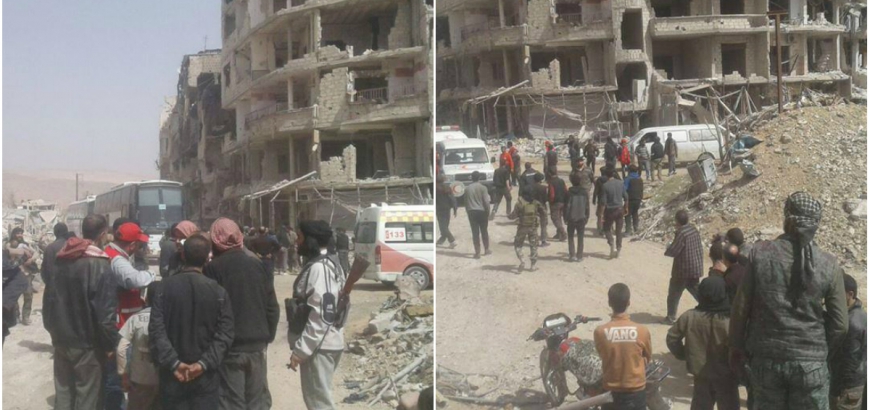Thousands of people under siege in the city of Harasta in the Damascus countryside began to be displaced on Thursday in an agreement that is the first of its kind in the Eastern Ghouta, which has been besieged by the Assad regime for years, while the latter exchanged a number of prisoners with opposition forces.
The regime's news agency SANA said that a convoy of Syrian Red Crescent cars and buses arrived at the Thanawiya roundabout in Harasta in preparation to remove opposition fighters and their families from the city, indicating that between 1,500 to 6,000 people would leave Harasta in two batches.
Prisoner exchange
In a related development, regime forces exchanged prisoners with opposition forces in the city of Harasta. Hezbollah’s Al-Manar television channel said that President Bashar al-Assad’s forces received 13 prisoners from the opposition in Harasta, while handing over five prisoners who they held in exchange.
On Wednesday, an agreement was announced between Assad’s forces and the Ahrar al-Sham movement which controls Harasta. The agreement was concluded with a “Russian guarantee” and included:
– Fighters exit with their weapons along with those civilians who desire to head to the north with Russian guarantees.
– The regime and the Russians giving guarantees to the residents who wish to remain in the city that no one there will be harmed and the city’s composition will be preserved without displacement or demographic change.
– The exit of families who wish to head to the north will begin on Thursday at 7 a.m.
– A joint committee be formed from Harasta residents inside and outside the city, in order to follow up on issues of those who remain there and to follow up on issues of prisoners and the conducting of the city’s affairs.
“Hard decision”
The local council for the city of Harasta issued a statement in which it described the agreement with the regime as being a “very difficult decision” and the bombardment the city was subjected to as “thousands of air raids and missiles, dozens of martyrs, destruction of 90 percent of the city and the siege by regime’s gangs and Russia.”
The council said that it was impossible to treat wounded with cellars being put out of service because of the regime striking with seismic rockets, adding that the city had 20,000 people who were sick and there was a lack of food and services.
The council closed the statement saying: “Today the round ends and the battle is not over. We will leave our land today to preserve what remains of our people, and our hope is in God that we will one day return to our roots after our country is liberated from tyranny.”
The Assad regime and its militias, with Russian backing, have recently regained large parts of the Eastern Ghouta, with thousands of civilians forced to flee after an unprecedented escalation began mid-February, which has resulted in the deaths of more than 1,500 civilians, and field hospitals and medical points going out of service.
Syrian opposition forces still control two large areas in the Eastern Ghouta, Douma and another in the south Ghouta including Joubar, Ain Termeh and Arbain.
This article was translated and edited by The Syrian Observer. Responsibility for the information and views set out in this article lies entirely with the author.


